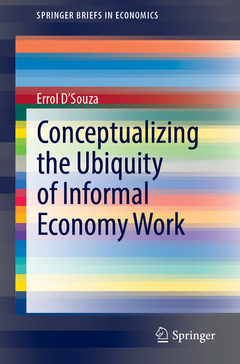Conceptualizing the Ubiquity of Informal Economy Work, 1st ed. 2020 SpringerBriefs in Economics Series
Auteur : D’Souza Errol

This book provides a framework to understand the disregarded aspect of emerging market growth which is informal employment. Informal employment in unregistered enterprises or of workers without employment contracts or social protection contributions constitutes 88 per cent of employment in India and is a ubiquitous feature of the economy. A large proportion of informal employment (86 per cent) is self-employment and this category of employment has been neglected in the literature on work and development which has focused instead on wage employment that is a contract for work with another person or enterprise.
The second leg of the literature takes a labour perspective and emphasizes mandated labour costs such as hiring and firing costs, benefits, and minimum wages as considerations when deciding on whether to engage labour on a formal or informal basis. The book broadens this literature by taking into account how the human capital of workers and the monitoring costs of ensuring that workers are adhering to the terms of negotiated contracts inform the decision with regard to informality. The book will resonate with those academics and policy makers who are engaged with the conundrums of development.
Errol D’Souza is Professor of Economics and Director, Indian Institute of Management Ahmedabad. He obtained his Ph.D. as a University Grants Commission National Research Fellow from the Jawaharlal Nehru University, New Delhi. He has held appointments such as the IFCI Chair Professor at the University of Mumbai, India Chair Professor at the University Sciences Po in Paris, as a Visiting Professor of the Indian Institute of Advanced Study, Shimla, as an Honorary Senior Fellow of the Institute of South Asian Studies at the National University of Singapore, a Visiting Scholar at Columbia University, and as a Visiting Professor at the Turin School of Development of the ILO. He has worked on academic committees of the University Grants Commission and the Indian Council of Social Science Research, and has been associated with the Planning Commission of India and the Reserve Bank of India in various capacities, including as a Member, Technical Advisory Committee on Monetary Policy. He has served on the Academic Councils of the Tata Institute of Social Sciences, Indira Gandhi Institute of Development Research, the Institute for Human Development, Delhi, and is on the Advisory Board of the International Centre for Development and Decent Work at Kassel, Germany, and the Boards of the National Institute of Public Finance and Policy, and India Gold Policy Centre. Professor D’Souza is on the editorial board of the Journal of Quantitative Economics (Springer), the Indian Journal of Labour Economics (Springer). His areas of research interest are macroeconomics, development finance and public policy.
Offers ?analytical and practical insights about the association between informal work and development
Focuses on the importance of informal employment for inclusive growth in emerging economies
Analyzes the informal sector through the twin approaches of public economics framework and labour perspective
Date de parution : 08-2020
Ouvrage de 86 p.
15.5x23.5 cm



